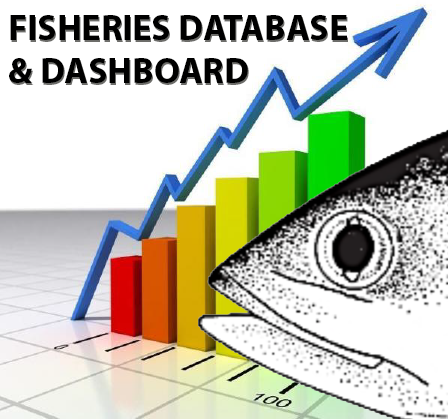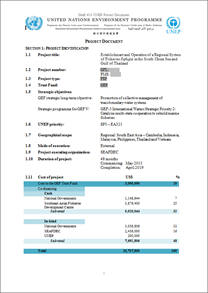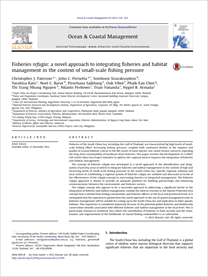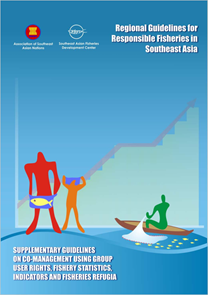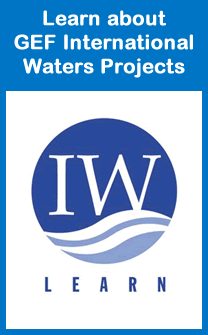THE SOUTH CHINA SEA FISHERIES REFUGIA INITIATIVE
FISHERIES REFUGIA PROJECT SITES
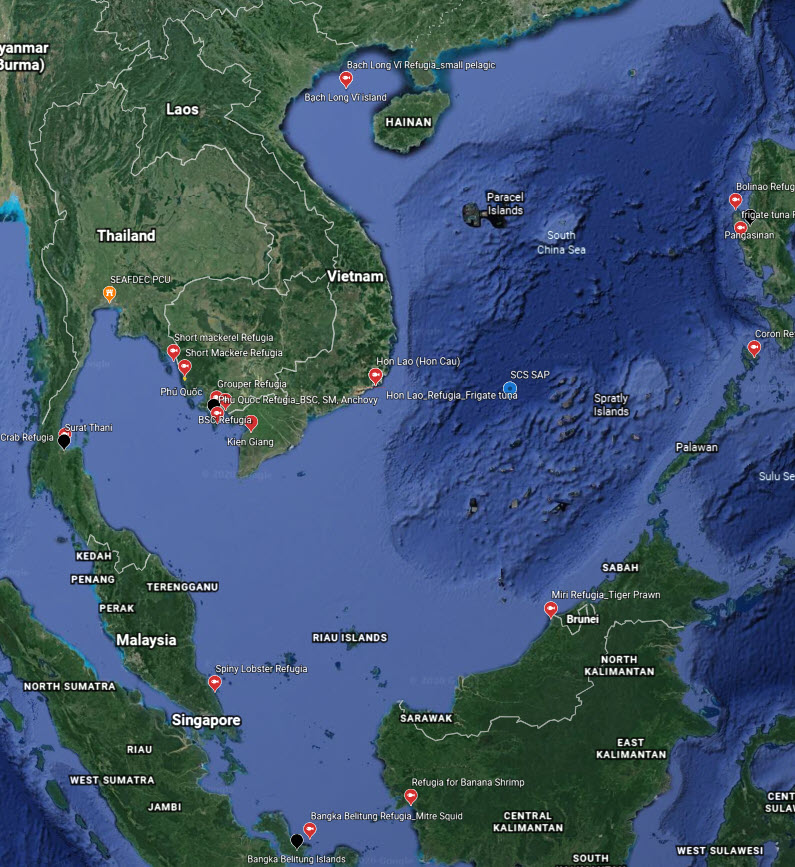 Click Here for
Click Here for More
Information
SCS SAP PRIORITY SITES (Habitat Linkages)
 All SCS SAP and
All SCS SAP and Fisheries Refugia
Priority Sites CHINA HABITAT
SITES CAMBODIA HABITAT
SITES INDONESIA HABITAT
SITES PHILIPPINES HABITAT
SITES THAILAND HABITAT
SITES VIET NAM HABITAT
SITES
TERMS OF REFERENCE FOR
THE PROJECT CO-ORDINATING UNIT
1. RATIONALE AND PURPOSE OF A PROJECT CO-ORDINATING UNIT
1.1 The Project Co-ordinating Unit (PCU) for the UN Environment/GEF Project entitled: “Establishment and Operation of a Regional System of Fisheries Refugia in the South China Sea and Gulf of Thailand” is established under the Project Document paragraph 124 as approved by the collaborating institutions and organizations during the project preparation phase as follows:
1.2 A regional Project Co-ordinating Unit (PCU) will be established within the Southeast Asian Fisheries Development Center for: overall coordination and supervision of the execution of the SEAFDEC/UN Environment/GEF project entitled “Establishment and Operation of a Regional System of Fisheries Refugia in the South China Sea and Gulf of Thailand” in line with the policy and administrative guidelines provided by the GEF, UN Environment and SEAFDEC. The PCU will be led by a Project Director and shall provide quality technical support, guidance and advice on the fisheries refugia initiative in the South China Sea.
2. ROLE AND FUNCTION
2.1 The PCU will be responsible for: overall leadership, management and technical oversight of the fisheries refugia project; regional project governance, monitoring and reporting; policy/technical advice and advocacy; regional coordination, including the establishment of partnerships and networking; and external communications.
3. THE PROJECT CO-ORDINATING UNIT SHALL:
3.1 Assume general responsibility for the day-to-day management and implementation of all project objectives and activities;
3.2 Prepare the annual work plan of the project, in a format consistent with SEAFDEC’s budget, work programme and monitoring and evaluation procedures and financial regulations on the basis of the regional UN Environment Project Document, and in close consultation and coordination with the Project Steering Committee, National Fisheries Refugia Committees, National Focal Points, the UN Environment Task Manager and relevant donors;
3.3 Provide Secretariat support to both the Project Steering Committee and Regional Scientific and Technical Committee;
3.4 Coordinate and monitor the activities described in the work plan, and report to UN Environment and the regional Project Steering Committee;
3.5 Facilitate liaison and networking between and among the 6 country participants, relevant regional organisations, other relevant organisations, non-governmental organisations, key stakeholders and other individuals involved in refugia project implementation;
3.6 Foster and establish links with other related programmes and projects and, where appropriate, with other regional GEF International Waters projects, e.g. IW: LEARN;
3.7 Oversee the development of Terms of Reference for consultants and contractors, and be ultimately responsible for the delivery of work produced by consultants under the fisheries refugia project;
3.8 Coordinate and oversee the preparation of the substantive and operational reports for the fisheries refugia project;
3.9 Collect and disseminate information on policy, economic, social, scientific, and technical issues related to operation of a regional system of fisheries refugia;
3.10 Promote public awareness and stakeholder engagement activities necessary for successful fisheries refugia project implementation;
3.11 Assist in the delivery of training courses on technical matters, project management, and monitoring and evaluation to strengthen regional capacity in GEF project execution; and
3.12 Lead in the development of integrated and simplified results tracking and reporting tools for the fisheries refugia project to ensure effective communication with national governments, SEAFDEC Council, UN Environment and the GEF.
4. MANAGEMENT OF THE PROJECT CO-ORDINATING UNIT
4.1 The Project Co-ordinating Unit will be led by a Project Director. He/she shall liaise directly with the National Focal Points and other relevant bodies and stakeholders were relevant. He/she will also liaise with representatives of UN Environment and GEF, as well as other regional donors, in order to coordinate the annual work plan for the project. He/she shall be responsible for all technical, planning, managerial, monitoring, progress and financial reporting for the project.
4.2 The Project Director will consult and coordinate closely with the Secretary General and other representatives of SEAFDEC and report directly to the Secretary General of SEAFDEC and to the UN Environment Task Manager. The position of Project Director encompasses the following major functions:
- Leadership, management and technical oversight of the fisheries refugia project;
- Regional project governance and monitoring;
- Policy/technical advice and advocacy;
- Regional and national coordination, partnership and networking; and
- External communication
4.3 A Project Accountant of SEAFDEC will be assigned to work under the direct supervision of the Project Director. The Project Accountant will: assist in the collation of project financial information and financial reporting to UN Environment and the GEF; prepare draft budget revisions and working budgets in consultation with the Project Director; assist the Project Director to prepare budget and financial statements for Project Steering Committee meetings and regularly brief the PCU on the financial status of the project; serve as an expert resource for the various committees and working groups of the project on financial reporting requirements; and provide will provide support to the PCU and the national teams on efficient and effective financial management, including training support.
4.4 Additionally, a Project Administrator of SEAFDEC will be assigned to work under the direct supervision of the Project Director. He/She will be responsible for the overall provision of administrative assistance and support across all aspects of the project. This will include: provision of administrative and technical support for the organisation of meetings/conferences; developing and maintaining the project’s filing system (electronic and hardcopies of all inward and outward communications); liaison with the National Lead Agencies on asset procurement and maintenance to ensure transparent and efficient procurement and operations of project assets; providing logistical support to the conduct of project activities (workshops, stakeholder consultations, arrangements of study tours, etc.); and arrange and organise travel for project staff.
5. APPOINTMENT OF THE REGIONAL PROJECT DIRECTOR
Decision-making regarding the selection and recruitment of this post will be made jointly by the UN Environment Task Manager and SEAFDEC. Selection criteria identified during project preparation are outlined below.
The selected candidate will have:
5.1 At least ten years of relevant experience in international development in cross-sectorial natural resource management with a minimum of ten years operating in developing country contexts at both strategic regional and technical national levels;
5.2 Proven skills in project team leadership, coordinating multi-disciplinary team inputs, and managing programmes and resources in developing countries;
5.3 Proven ability to work with partners and the ability to plan, coordinate and manage complex programmes and projects in developing countries;
5.4 Demonstrable excellent verbal and written communications skills, both at a technical level and in the preparation of information for policy makers and wider civil society;
5.5 Previous experience in the operational aspects of large UN-implemented projects or similar regional/multi-country projects in developing countries, as well as experience with funding organizations such as the GEF will be an advantage;
5.6 Post-graduate qualifications in one or more of the following disciplines: fisheries science and management, coastal policy and planning, and/or ecology;
5.7 Excellent working knowledge of English;
5.8 Familiarity with the goals and procedures of international organizations, in particular those of the GEF and UN Environment; and
5.9 Knowledge of GEF co-financing approaches will be a distinct advantage.
